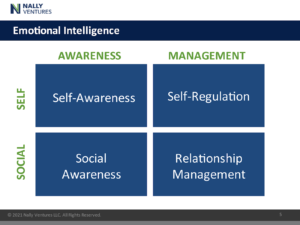
IQ + EI = Effective Leadership
Just as important as intellectual ability and subject matter expertise, emotional intelligence (often abbreviated EI) is a distinguishing characteristic of effective leaders.
For many years, “hard skills” trumped “soft skills” in the workplace. Education and expertise in a particular domain (technology, law, finance, marketing, and the like) were more likely to land someone a leadership role than more human-centric abilities like creativity, collaboration, empathy, personality, and adaptability. Today, though, that practice has shifted. Organizations now realize that BOTH hard and soft skills are essential for leadership effectiveness. Some research shows that soft skills may be even more important overall.
What is emotional intelligence?
Emotional intelligence is a type of soft skill that is both inward-facing and outward-facing. Inwardly, emotional intelligence (EI) refers to someone’s ability to be aware of, control, and express their emotions. Outwardly, EI refers to the ability to recognize and respect others’ emotions and handle interactions and relationships in a careful and empathetic way.
Sometimes, you may see the abbreviation “EQ” for emotional intelligence. EQ refers to the testing and measurement of emotional intelligence, much as IQ refers to the testing and measurement of intellectual intelligence.
EI and the bottom line
At face value, emotional intelligence is inherently an important quality. After all, who doesn’t think it’s important to be in control of one’s emotions and mindful of the emotions of others? But beyond that, one of the reasons EI in the workplace is getting so much attention is the link between EI and outcomes.
Consider these points supporting EI’s positive impact (just a few of many examples from research into the value of EI):
- Stronger performance
“There is a direct correlation between increased job performance when employees are high in EQ. Emotional intelligence is responsible for 58 percent of performance in all types of jobs, and 90 percent of top performers are high in EQ.”
(https://www.workforce.com/news/the-business-case-for-emotional-intelligence) - Higher productivity
Competency research in over 200 companies and organizations worldwide suggests that about one-third of the difference in productivity between top performers and average performers is due to technical skill and cognitive ability while two-thirds is due to emotional competence. (In top leadership positions, over four-fifths of the difference is due to emotional competence.)
(https://learninginaction.com/wp-content/uploaded-files/2013/01/EQ_in_the_Workplace.pdf) - Less likelihood of job derailment
The primary causes of derailment in executives involve deficits in emotional competence. These are primarily: (1) difficulty in handling change, (2) not being able to work well on a team, and (3) poor interpersonal relations.
(https://learninginaction.com/wp-content/uploaded-files/2013/01/EQ_in_the_Workplace.pdf) - Better results
Insurance sales agents who were weak in emotional competencies, such as self-confidence, initiative, and empathy, sold policies with an average premium of one-half the value of agents who were very strong in at least 5 of the 8 key emotional competencies.
(https://learninginaction.com/wp-content/uploaded-files/2013/01/EQ_in_the_Workplace.pdf)
The four factors of EI
Psychologist Daniel Goleman, a renowned author and researcher of emotional intelligence, developed this model of emotional intelligence based on four quadrants: self-awareness, social awareness, self-regulation, and relationship management.

As you can see, the model encompasses both inward (self) and outward (social) components of EI. In a follow-on post, we’ll look at ways to develop capabilities in each quadrant.
Our leadership development offerings specifically build emotional intelligence in current and aspiring leaders at all levels. Here’s how.
How can we help your leaders and business excel?
